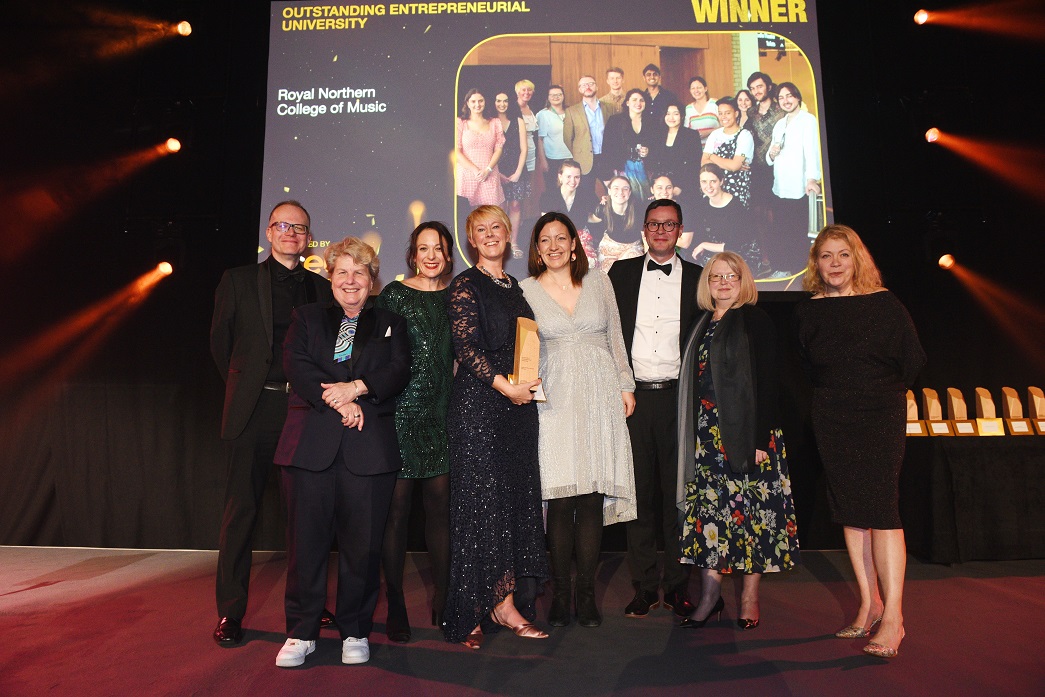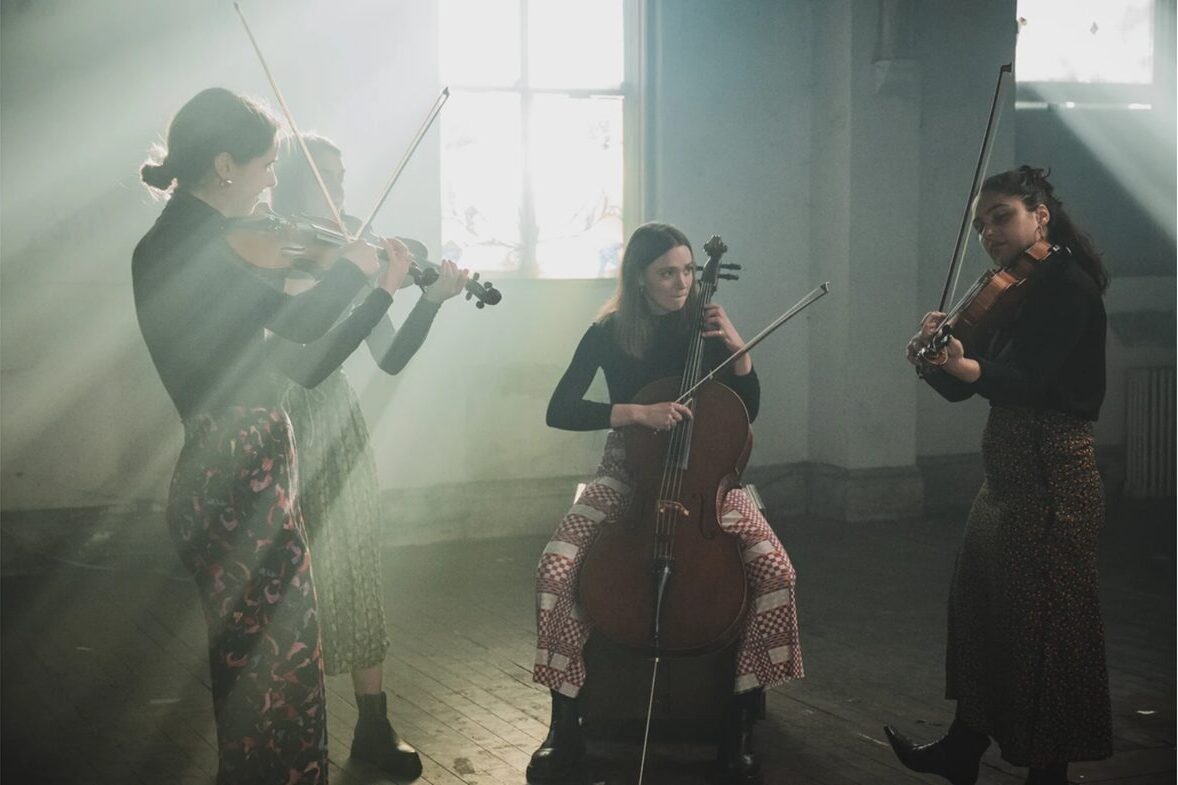Sound business sense: the entrepreneurial conservatoire teaching Tchaikovsky and tax returns
Fresh from collecting the RNCM’s prestigious Times Higher Education Award 2023 for Outstanding Entrepreneurial University, Head of Enterprise (Academic) Michelle Phillips talks about the critical role institutions must play in preparing their students for success beyond their studies.
Sarah Walters
The Royal Northern College of Music (RNCM) isn’t a business school, but it is in the business of creating career ready graduates. As it turns out, there’s more to that perennial groan with school friends about why long division and not tax returns were on the maths curriculum after all; an alumni survey conducted by the world-class conservatoire suggested that graduates believe real world business training would have been a significant asset when moving from education to the workforce.
In response, Head of Enterprise (Academic) Michelle Phillips and the team at the RNCM built the StART Entrepreneurship Project, a future-facing programme that has just helped the College to scoop a Times Higher Education Award for Outstanding Entrepreneurial University – topping a tough category which included similarly progressive but much larger institutions, such as the University of Edinburgh and London South Bank University. The win brings RNCM’s THE Award total to an impressive five.

RNCM staff collecting the Times Higher Education Award for Outstanding Entrepreneurial University
RNCM’s focus on entrepreneurial skills – including finance, tax, project planning and management, networking, idea generation, and pitching – as well as its in-house artists agency (which provides opportunities for students to undertake paid freelance work alongside their studies) caught the attention of the judges, who remarked that the College ‘really demonstrated what can be done’. Students now spend around a third of their study time learning essential enterprise and entrepreneurial skills – getting clued up on the business of being a musician.
For Michelle (who is also a chartered accountant, a professional saxophonist, and Senior Lecturer in Music Psychology), the award is a tremendous badge of honour ‘for something we’ve been good at for a long time’. It affirms her belief that universities, particularly those that specialise in the creative arts, have a responsibility to equip students with the tools to go out and define what the music industry will look like next – not simply to train graduates to fit in now.
‘We have a lot of evidence that creative graduates need entrepreneurial skills more than graduates of other disciplines,’ says Michelle. ‘They’re much more likely than any other graduate to have a career in which they earn freelance income.
‘So, how do you make sure graduates are equipped with skills to embark on their self-employment careers, to effectively start new businesses? This should really be a top priority for conservatoires; it’s our responsibility to train our students for their careers, and it would be irresponsible of us not to do so. A trumpeter needs to spend time honing their craft – practicing, of course, and performing in orchestras and ensembles, attending masterclasses, and playing in small ensembles – but to thrive in the music industry they need to also develop skills in presenting themselves, at networking, at working out their own rates and doing their taxes – all those professional skills.
‘The RNCM is full of incredible and world-renowned musicians who are our professors and tutors, who teach the students to the highest standards. Alongside this practical training, we need to develop our students’ employability and freelance skills. The industry has changed in exciting ways that require musicians to be more innovative. We have a responsibility to equip the students with the ability to go out and make a difference in the world with their music.’
Nurturing the next generation of musicians in a progressive educational environment has long been the focus of Principal Professor Linda Merrick CBE. In fact, the RNCM was recognised for its unique work in supporting professional studies as far back as 2005, when it became the only conservatoire to be awarded a substantial grant to create a new Centre for Excellence in Teaching and Learning (CETL) Research Centre for the Vocational Training of Musicians. From the moment new students arrive at the College, they are encouraged to think about how they can use their talents and training to create value: economic, societal, and cultural.
‘When I say to the students, “What’s the fire in your belly? What do you want to do with your music?”, many talk about climate change, the ageing population, equality, loneliness, about something in the world they believe needs more attention – what some may call ‘social entrepreneurship’. Entrepreneurship is saying, “Right, let’s generate ideas to have an impact on this, let’s design a project, let’s pitch that project to get some funding”.
‘There’s a principle called effectuation which says that if you want to train people to be entrepreneurial, there are two ways you can do it: you can look for a gap in the world and work out how to fill it, or you can start with who you are, what you have, what you believe in and feel passionately about, and you can use those qualities and resources to make something that no one has even imagined yet. Young people want to change the world with their music. If our work helps more of these incredible graduates to generate value in the world, what more could we want?’

Ensemble Vulva Voce, winners of the 2022 RNCM Creative Innovators Award
Already, this unique mix of music and business is inspiring students in unexpected ways. Wellbeing and awareness sit at the core of many of their big ideas; so far, they’ve used music to spotlight sexual abuse and educate audiences about mental health issues, to design an innovative sculpture that ask questions about urban development and nature, to set up a community orchestra, to challenge industry gender imbalances, and they’ve employed social media to lobby the government for better music education in schools. Many of these projects have also received generous support from the RNCM Creative Innovators Award, which offers students the chance to pitch their ideas and secure part of a £5,000 prize fund to help make them happen (this prize is also backed by Yamaha, who contribute £1,000 to the annual pot).
Further encouraging students to be bold and ambitious is the College’s fresh approach to assessment. Final year students must devise, plan, and run an independent project ‘that can be absolutely anything that stems from their creative expertise’, but the assessment of that work comes from the students’ own learning and development – their critical reflections being the final written submission on which they’re graded. The system, Michelle explains, encourages students to take bigger risks with their work; they become ambitious and less risk averse. ‘And that’s where new ideas in the music industry come from.’
Just as the College looked to its graduates with StART, major academic institutions are now looking to the RNCM for inspiration on entrepreneurial education. ‘We are really on the map,’ Michelle enthuses. ‘Thanks to our winning a Triple E Award for Young Entrepreneurial University of the Year earlier this year, our two-year StART Entrepreneurship Project, and now this THE Award, a lot of world leaders in the entrepreneurship education sector are messaging me.
‘The Principal Consultant and co-founder of Enterprise Evolution, Alison Price, sent me a message congratulating us for our “hard work, entrepreneurial resilience and drive”. People in the entrepreneurship sector are seeking us out and asking us what we’re doing.’
13 December 2023

